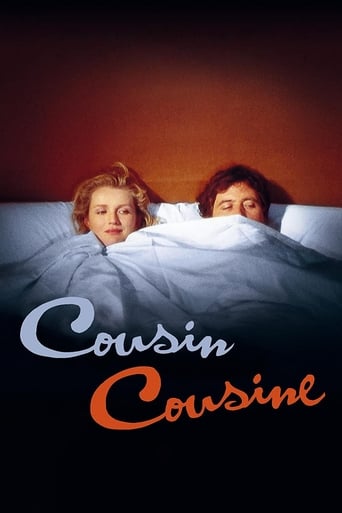

good back-story, and good acting
... View MoreFar from Perfect, Far from Terrible
... View MoreIf you like to be scared, if you like to laugh, and if you like to learn a thing or two at the movies, this absolutely cannot be missed.
... View MoreThere is, somehow, an interesting story here, as well as some good acting. There are also some good scenes
... View MoreIf the movie had just been about a man and a woman having an affair after their partners first had an affair, this might have been a good movie. The first unfaithful pair consisted of a guy who was a serial adulterer who should have needed a case of Viagra just to keep up with his many affairs and the lady was a self-involved neurotic. SO, when THEIR spouses get together and build a friendship and then eventually sleep together, you have some sympathy for them. BUT, what about the children? They both have kids (and one of them is pretty young), but all they are concerned about is their infatuation and getting back at their unfaithful spouses. While this might have been accepted by audiences when the film was released, I just felt this was ugly and selfish. They could have divorced their slimy spouses, but neither showed any regard for the innocent kids. The film is well-made but way too self-centered to have any positive lasting message.
... View MoreIf you have a playful sense of humor and enjoy films with an early Fellini (celebration of life-quirky characters) flavor, you should make it a point to watch "Cousin Cousine". Released in 1975, on the surface this is just an off-beat love story about two middle-aged "cousins-by marriage" who are drawn to each other by a shared playfulness. These kindred spirits awaken in each other a zestful and irreverent attitude toward life that distances them from their large (and somewhat strange) extended family. They want to experience as much of life as possible, the man has made it a practice to change professions (not just jobs) every three years so that nothing gets stale. They are very open about their affair, reasoning that the rest of the family will think the worst anyway. Not surprisingly their affair also distances them from their respective spouses, who do not share their fun-loving and irreverent attitudes.The lovers are played by Christine Barrault (nominated for an Oscar) and Victor Lanoux. Although they are fun and likable characters, most of the comedy in this film emanates from the performances of the actors who play their respective spouses. Guy Marchand plays Barrault's husband as a cranky and pathetic Cassanova whose philandering lifestyle is cramped by his inability to cope with his wife's sudden infidelity. Marie-France Pisier, as Lanoux's neurotic airhead wife, subtly steals each scene in which she appears; when a character introduces themselves with the revelation that the only time they have ever been happy was during hypnotherapy, you know that interesting moments are ahead. And for what it is worth Pisier is breathtakingly beautiful.The affair causes the Marchand and Pisier characters a great deal of pain for most of the film, but by the end they have pretty much adjusted to everything. Marchand has resumed his pursue of other women and Pisier has returned to her main source of pleasure-therapy. Marchand's regeneration occurs with his first playful moment, he mounts a knife (fake) in his back and staggers into the living room to the shock of the assembled relatives. While Pisier's regeneration is the best scene of the film. Alone and fully clothed in the bathroom, she half-heartedly tries to slit her wrist with a razor blade and falls backward into the empty tub, which she unexpectedly finds a pleasant and relaxing place to think. And how appropriate since the bathtub is a device we associate with privacy, purgation, relaxation, openness, and regeneration.They say that all films are political and "Cousin Cousine" is no exception. Films have the power to deconstruct the traditional values of society and this love story is also a social commentary on the hypocrisy and double-standards of 1970's western middle class culture. And while pointing out these issues it offers psycho-political messages that each viewer can relate to personally and specifically. The theme is that each day should be a celebration of life, experience, and growth.The grandfather is shown as someone whose long life has given him a real perspective. He is pleased when his teenage granddaughter reveals that she has discovered sex and found it to be wonderful, delighted that she has found something see finds wonderful and amused because her joy is so contrary to the nihilism she had been embracing. He is self-sufficient, the widowed grandmother from the other side of the family enjoys being with him but realizes that he is perfectly comfortable and prefers living alone. He is disturbed by the failure of the family to take any significant time from their lives to mourn his brother's passing.The strange antics of the adults in this extended family are a source of great amusement to the observant children. The carnival music score gives the many extended and flowing group shots a pleasing circus side-show attraction flavor.Note how the film opens with one of families driving to the wedding; parents in the front seat, brother and little sister in the back seat. The parents are agitated and scolding, the children calm and attentive to the experience of the moment. They go out of the scene with the little sister sliding over to be closer to her brother and smiling in adoration. The same little observant girl appears in close-up periodically throughout the film, smiling in amusement at the antics of everyone around her. The film ends with the little girl smiling serenely out the window as she watches the lovers leave on their motorcycle.
... View More"Cousin Cousine" had a huge popular success in the United States (as probably everywhere else) when it was released in the 1970s. It is nothing more than a love story about a middle-aged man and woman who are estranged from their respective spouses. They openly profess and privately consummate their love, everybody be damned. The movie's value lies in its anarchic and refreshingly droll (drôle?) spirit. The lovers are the lovely Christine Barrault and her cousin by marriage, Victor Lanoux. They win our sympathy because they are such a delightful contrast to the sham and self-pity of their respective mates, Guy Marchand and Marie-France Pisier. Marchand is an especially hilarious cranky type. Jean-Charles Tacchella directed this bubbly and, yes, "gallic" comedy with wit and sensitivity, and you can't help enjoying it immensely. So all this makes adultery OK? Well, we at least are supposed to think that. The movie was remade in 1989 as "Cousins" with Isabella Rossellini and Ted Danson in the two leading roles.
... View MoreI first saw Cousin, Cousine when it was released and saw it again this evening. In the guise of a light comedy (with twinkly peppy little music), this movie is virtually a dirge for matrimony but is yet more striking for the gaiety with which humiliation is deliberately caused the outsider, and the astonishing ease with which even youngsters treat their parents' abandonment of their marriages. It is an extraordinary movie - as foreign from reality in its treatment of the young children's reaction to their middle class parents' humiliation of their other parents before all their relations, as any science fiction movie. ***SPOILERS*** Moreover, the movie shows the utter indifference of those alive toward those newly dead - the impatience to leave the funeral, the distraction at the gravesite by the possibility of sex with an attractive stranger, an absence of family feeling so devastating that the brother of the deceased cannot get a single person from the family to lunch with him upon the funeral's conclusion - exams, work, swimming all take pre-eminence. Although presented as a "comedy", this is one of the gravest indictments of the destruction of the family. The protagonists: a man who's destroying his second marriage by his deliberate infliction of humiliation upon his second wife in front of his daughter - he pushes his wife into attempted suicide and attempted abandonment of her stepdaughter; and a woman who repeatedly says she sought to kill herself a year before, has previously been unfaithful to her husband and now does so again in spectacular fashion - before her young son. Their spouses: a man whose train of affairs has led him to merely 30 fewer than Casanova and a woman whose inability to cope with her husband's feckless approach to life (e.g., the changing of jobs every three years), has led her to most enjoy sleeping - these two will leave their spouses to have sex during the course of the wedding reception of their spouses' mother and uncle. In its portrayal of a family past all caring, the movie is fascinating. As the rest of the family celebrates the birth of Christianity in one room, two of the members commit adultery in the next - yet other family members pleased at the humiliation, prevent their interruption. The amazing thing is the absence of the humiliation's effects on the zombie-like remainder of the family who seem to romp: a) in the knowledge that their parents and children, sisters and cousins, will again divorce due to the betrayal of their spouses, and b) in the humiliation of their parents. But perhaps the effects are indeed there - one daughter announces her intention of killing all human beings - when she announces her retraction of the decision - it is only because human beings are not worth her trouble - and the other couple's son is often cranky - he wants to go home, but must wait for his father to finish sex with another. The stories the children tell each other all revolve around the debauchery of family members; the pictures the female child takes at weddings are of fornicating members of the family, the drunken exhibitionism of the grandfather, and the sickness of other drunken members. Toward the end of the movie, the girl announces to her grandfather that she had sex the previous week - the grandfather kisses her forehead! Perhaps the moviemaker does realize the awesome effects of the debauchery on the family. The movie is quite dark - the female protagonist asks that she be made to cry because she has never been able to do so - the male middle aged protagonist who shrugs when asked about what work he would ever like to do in life. Neither has any sympathy for the spouses upon whom they seek to inflict public humiliation as frequently as they can - at family weddings, at family funerals, at gatherings at restaurants. When one spouse leaves after attempted suicide, there is parental indifference and smiles by the children. **** End of Spoilers **** This is an amazingly creepy and depressing movie.
... View More